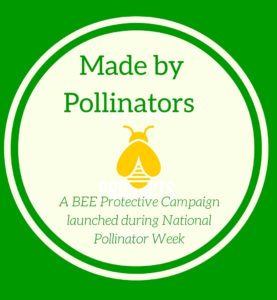16
Jun
Restaurants in Nation’s Capital Feature Foods Reliant on Pollinators for National Pollinator Week
(Beyond Pesticides, June 16, 2017) In recognition of the importance of pollinators to food production during National Pollinator Week, June 19-25, Beyond Pesticides and the Center for Food Safety are teaming up with restaurants in the Nation’s Capital for the second annual “Made by Pollinators” campaign. The campaign will bring awareness to the issue of pollinator decline, which pesticides play a leading role in through lethal and chronic effects on these critical species. Participating restaurants, including Busboys and Poets, Lavagna, Logan Tavern, Restaurant Nora, Tabard Inn, and Vegetable and Butcher, will educate the public on the importance of pollinators by annotating their menus or offering pollinator-inspired specials that contain ingredients reliant on pollinators for production. One out of every three bites of food requires pollination, a fact these environmentally conscious restaurants will share with their patrons during National Pollinator Week 2017.

Busboys and Poets remarked that, “Without bees, we wouldn’t be able to serve 99% of our menu. Our participation in Pollinator Week is a small step toward a movement to promote the health of our planet’s ecosystems.” By sourcing a multitude of their ingredients from organic farms, Busboys and Poets does their part to support pollinator health.
Lavagna stated, “We’re thrilled to participate in Pollinator Week to educate our community about how integral pollinators are in creating our favorite foods. At Lavagna, we source local, organic ingredients to do our part to protect the hard working pollinators.”
Logan Tavern said, “Pollinators are the unsung heroes of our food system. We are privileged to constantly witness their role first hand on our farm, EatWell Natural Farm, in La Plata, Maryland. During Pollinator Week, we will serve a number of dishes that highlight the roles that pollinators play in producing necessary ingredients for the delicious food at your table; come see what all the buzzzzz is all about!”
Nora Pouillon, owner and founder of Restaurant Nora, America’s first certified organic restaurant, said, “Bees are the most important thing for sustainable food growth, which is one of the reasons I source 100% organic food, free of pesticides that may cause pollinators harm.” She continued, “My business partner takes it even one step further and raises bees.”
The Tabard Inn stated, “We believe it is important for us and our future generations to protect our environment and encourage smart use of our resources in as many ways as we can. By collaborating with local organic farmers, national organizations, and specialized purveyors, we aim to better the quality of our products, and ultimately everyone’s health. At the Tabard, we strive to use pesticide-free, environmentally-responsible products in all of our departments on a daily basis.”
Vegetable and Butcher said, “Bees play a vital role in our food system, and our menu wouldn’t be the same without them. Participating in Pollinator Week is one way for us to support better farming practices and further our commitment to sourcing sustainable ingredients.”
“We are thrilled at the positive response we have received from the participating restaurants, all of which are leaders in the Nation’s Capital when it comes to sourcing organic and sustainable food,” said Jay Feldman, executive director of Beyond Pesticides. “We are especially excited about the potential this campaign has to bring awareness to the problem of pollinator declines, educating restaurant patrons on the critical role that pollinators play in our food system.”
“This week and every week we should be doing everything we can to protect bees and other pollinators that are critical to our health and the health of our food system and environment. We cannot afford to let alarming pollinator population declines continue to go unchecked, which is why we’re grateful to these restaurants for their leadership in helping to raise awareness about these important issues,” said Larissa Walker, Center for Food Safety pollinator program director.
National Pollinator Week began in 2006 when the U.S. Senate unanimously approved the designation of a week in June to address the urgent issue of declining pollinator populations. However, in light of federal inaction, Minnesota, Connecticut, and Maryland have taken steps to eliminate the use of pollinator-toxic products, and many local communities throughout the U.S. have passed pesticide reform policies. While much remains to be done to combat contributing factors to pollinator declines, such as the use of neonicotinoid pesticides and disappearing pollinator habitat, National Pollinator Week is a chance to reflect and celebrate the achievements of the past year, while simultaneously raising awareness of the important role pollinator’s play and the threat that pesticides pose to their very survival.
In addition to the “Made by Pollinators” campaign, here are some things you can do for pollinator week. Here’s what you can do:
1) Organize a Meeting in Your Community. Utilize a public space, such as your local library or community center, have a house party, or host a pollinator-friendly dinner and view the talk Bees, Pollinators, and Biodiversity, by Vera Krischik, Ph.D. from Beyond Pesticides’ 35th National Pesticide Forum. This is a perfect opportunity to have a discussion with your friends and neighbors about the serious issue of pollinator decline and what you can do.
2) Make Change Happen in Your Community. Armed with allies and resources from your video screening party, go to your elected official and ask them to introduce the Model Pollinator Resolution and/or our Model Lawns and Landscapes policy.
>>Get the Model Community Pollinator Resolution here, and our Model Lawns and Landscapes Policy here.>For more information, or help with your campaign, see our fact sheet, How to Start Your Own Local Movement, see our BEE Protective webpage, or get in touch with us. Build the buzz in your community to make changes that will protect your local pollinator population!
See also Pollinator Week 2017 webpage.
All unattributed positions and opinions in this piece are those of Beyond Pesticides.










